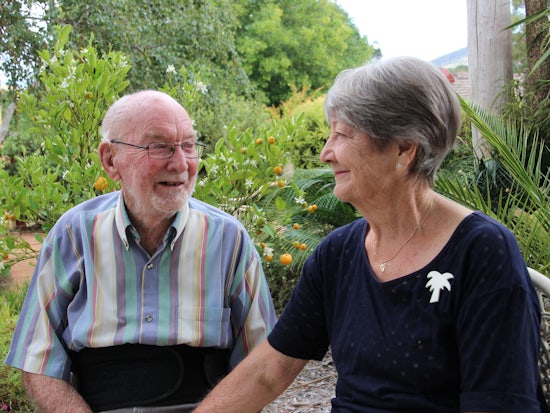Counting the cost of dementia
With dementia expecting to cost the community predicted to be over $14 billion this year and the number of Australians living with dementia increasing to over 400,000, Alzheimer’s Australia is calling for a staged approach to implementing a funded National Dementia Strategy.

Dawn and Glyn McKay’s lives are affected by dementia and they have welcomed calls for improvements to dementia care and support
A report released this week predicted costs will increase to more than $18 billion by 2025 and 536,000 people will be living with dementia if nothing is done. By 2056, the report predicts the number of people with dementia will be 1.1 million people and costs will hit $36 billion.
Commissioned by Alzheimer’s Australia, The Economic Cost of Dementia in Australia 2016-2056 report also found just a five per cent reduction in the number of people developing dementia over the age of 65 could lead to savings of $5.7 billion from 2016-25, and $120.4 billion by 2056.
Alzheimer’s Australia National President Professor Graeme Samuel AC says the figures contained in the report by the University of Canberra’s National Centre for Social and Economic Modelling (NATSEM) were alarming and a very big wake-up call.
“Dementia, which is a National Health Priority Area, is one of the major chronic diseases of this century,” Professor Samuel says. “It is already the second leading cause of death in Australia and we know that the impact is far reaching.”
He has renewed the call for a funded National Dementia Strategy to deal with the issue, along with a greater focus on risk reduction measures.
“Despite the social and economic impact we still do not have a fully-funded national strategy to provide better care and outcomes for people who are living with dementia now, nor are we taking risk reduction seriously in order to try to reduce the numbers of people living with dementia in the future,” he says. “The time for action is now. If we don’t do something now, the cost is going to continue to grow to unsustainable levels.”
Deputy Director at the Institute for Governance and Policy Analysis NATSEM, Professor Laurie Brown says the significance of these new, national dementia figures could not be under-estimated.
“What these figures show is an alarming upward trend of not only the number of people likely to be living with dementia over the next 40 years, but also the tremendous economic impact this will have on the entire Australian population. Not to mention the lasting social impact on those living with dementia, their carers and family and friends,” Professor Brown says.
“The sharp rise in the number of people likely to be diagnosed with dementia in the next 40 years, and the more than doubling of current estimates on the economic costs of dementia in Australia, is largely due to the increasing number of older people in our population and the fact that Australians are living much longer. As well, we now have access to better Australian-based data on the number of people likely to have dementia now and into the future,” she adds.
Professor Brown believes a whole-of-community approach to risk reduction, and better co-ordinated care, along with a boost to research, is going to be needed if we are to curb the rise in people living with dementia by 2056.
In the 2017-18 pre-budget submission to the Federal Government, Alzheimer’s Australia has called for a staged approach to implementing a funded National Dementia Strategy, with immediate action on funding:
- for a more comprehensive risk reduction program to raise awareness of brain health and the links between lifestyle and health factors and the risk of developing dementia, cognitive impairment and other chronic conditions ($3 million);
- to develop a consumer-based Quality in Dementia Care program to improve aged care services, both in residential aged care and in the community ($1 million);
- to improve access to quality respite care to better support people with dementia living in the community, their families and carers ($15 million).
Dawn and Glyn McKay from Canberra have welcomed calls for improvements to dementia care and support. Mr McKay was diagnosed with vascular dementia six years ago, and attends respite twice a week, which Mrs McKay says is appropriate and engaging.
“It is so important for people with dementia to be able to continue to have social engagement.”
In addition to improvements to quality care, respite and support options, Mrs McKay would like to see dementia research given similar priority to other chronic health conditions.
“People living with dementia need quality community, aged care and respite options,” she adds.
Key findings from The Economic Cost of Dementia in Australia 2016-2056 are available on the Alzheimer’s Australia website.
For dementia information and support contact the National Dementia Helpline on 1800 100 500











![The new Aged Care Act exposure draft is slated for release in December of 2023, but advocates hope to see it rolled out on January 1, 2024. [Source: Shutterstock]](https://agedcareguide-assets.imgix.net/news/articles/wp/agedcareact__0811.jpg?fm=pjpg&w=520&format=auto&q=65)












Comments